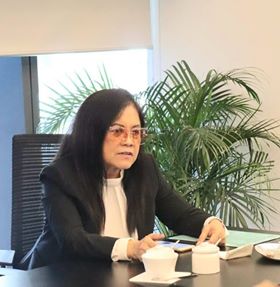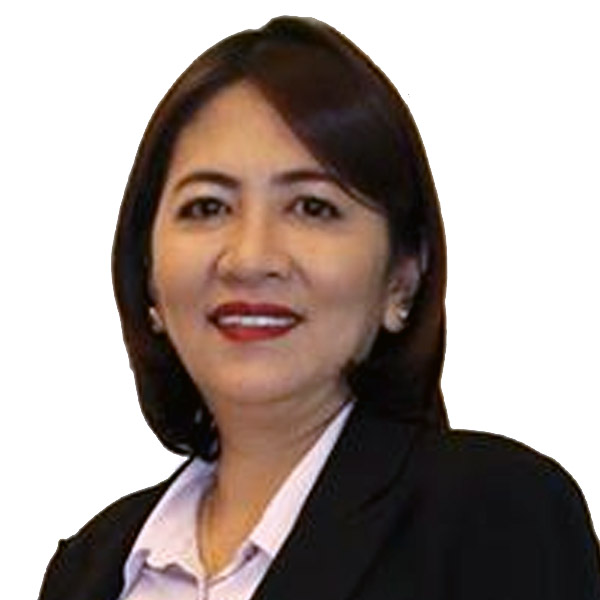
by Myk | Aug 16, 2020

A LOOMING PARADIGM SHIFT
By: CRB Norie G. Datar
The unprecedented magnitude of the tragic brought by the global outbreak of COVID-19 and as the world continues to battle the war against this virus, by force of nature slowly changed the way people live and think, driving us to adapt a new life model, attuned to the changing environment. People are learning to adapt a “flux mindset”, exuding the power of resilience, moving into a new direction, a new roadmap to bridge the situation now and then.
How do we moved-on with the changing times? As we navigate the world of real estate and recognizing the industry as one of the major economic drivers in the Philippine economy and the real estate service practitioners’ key role, it is of paramount importance to look at the aspects in the practice that have directly impacted by the pandemic that leaves us no better option but to stay relevant to the new environment.
With all rationality, I am looking at the Continuing Professional Development (CPD) program, as one aspect. It is crucial at this point in time that we maintain a strong working knowledge with reasonable proficiency. It is now time to re-evaluate the kind of knowledge and the kind of learning materials we need to possess. We need to provide fresh knowledge, most relevant at this time and shelved those recycled lecture materials. We need to re-establish an acceptable and doable standards of learning to further strengthen the future of our profession. We need to shift trajectory and infuse subjects that are apt with the changing times.
Another aspect that we should be looking at, is the proliferation of unlicensed practitioners. We have aired so much of our sentiments at the various social media platforms, now it is time to zero-in and act constructively on how we should be dealing the issue, not discounting human consideration, as we all need to survive. While waiting for the rebirth of AIPO, we can do our part to address this most defining issue of our time. Let us create a venue to collaborate and deliberate professionally, in order to come-up with an effective ways to institutionalize our practice.
As people look at the future of the industry as bleak, clouded by fear and uncertainty, it is therefore, high-time to recalculate, find new territories, and break new grounds, to see lights and brightness.
Should we be ruled by fear and uncertainty?
Just my two cents.
CRB NORIE DATAR
REBAP Global City
About the author
CRB Norie G. Datar, MPA, DTM, REA, REB, EnP., is one of the 2020 REBAP Global City Chapter Advisers. She was 2015 and 2016 REBAP Chapter President for Global City, 2018 REBAP National Board of Trustees and 2019 REBAP National Secretary General.

by Doah Sto. Tomas | Jul 13, 2020

You’re determined to break into the real estate industry. Good for you! But as you learn more about the industry, you hear terms like Project Selling and General Brokerage and wonder if there’s really a difference. We’ve created a simple table below to help you decide where you really think you are better suited. Here’s a breakdown of the difference between the two:
In this table, we focus first on the differences from the perspective of an agent:
| Salesperson – Project Selling |
Salesperson – General Brokerage |
| If working for a developer, they are usually referred to as “in-house agents” |
Normally referred to as “property specialists” or “real estate salespersons” (if PRC-licensed) |
| Generally given an allowance |
Generally, earns on commission basis only |
| Usually assigned a sales quota |
Normally does not have a sales quota |
| Works in an office with regular working hours |
Flexible working hours. Can work in an office or from home (depending on the arrangement with the broker or realty corporation) |
| Can either be regular or contractual employees |
Generally, no employee-employer relationship exists between the agent and the broker |
| Work is normally limited to selling. Documentation and transfer of titles is done by the developer |
Generally more experienced than in-house agents as they know how to take care of the documentation and registration for the buyer and seller. |
|
If assigned to a broker working for a specific developer (i.e. an in-house broker), agent is usually limited to selling property of the developer only.
If assigned to a broker that works for (or owns) a realty corporation that is accredited with multiple developers, agent can sell properties of developers the broker is accredited with (i.e. “sell-all”)
|
|
Entitled to commissions
|
| If under an in-house broker, commission rate is dictated by the developer.
If under a “sell-all” broker, commission rate will vary per developer |
Rate is dependent on agreed arrangement with broker (rates are usually higher) |
| Must obtain DHSUD ( formerly known as HLURB) accreditation, regardless if agent is doing project selling or “sell-all”. |
Not required to obtain DHSUD ( formerly known as HLURB) accreditation as long as properties being handled are FSBO (For Sale By Owner). Otherwise, both broker and agent must secure accreditation in order to do project selling. |
| Must be assigned to a licensed broker in order to be able to sell properties |
| Under RESA law (RA 9646), a person can only be called a “real estate salesperson”, if they obtain a PRC (Professional Regulation Commission) license and is assigned to a licensed broker |
Next, let’s look at project selling and general brokerage from a broker’s point of view:
| Broker – Project Selling |
Broker – General Brokerage |
| Must pass the broker’s licensure exam in order to be PRC-licensed. Once the license has been issued by the PRC, the broker will be able to operate and manage a real-estate business, aside from selling and/or leasing properties. |
| Must undergo continuing professional education (CPD) courses |
| Answerable to the Real Estate Code of Ethics as required by the PRC |
| Must obtain DHSUD ( formerly known as HLURB) accreditation, regardless if broker is doing project selling or “sell-all”. |
Not required to obtain DHSUD ( formerly known as HLURB) accreditation as long as properties being handled are FSBO (For Sale By Owner). |
| If working for a developer, can only sell property of the developer.
If working for a realty corporation accredited with multiple developers, can sell all properties the realty corporation is accredited with. |
Can sell / lease all types of properties.
In the case of project-selling, the broker (or realty corporation) should be accredited by the developer(s).
|
| Usually assigned a sales quota |
Normally does not have a sales quota |
| Works in an office with regular working hours |
More flexible, can work from home. May optionally maintain an office if the broker owns the realty corporation.
|
| Brokers have more freedom with their work arrangement with the developer or realty corporation.
Does not have any employer-employee relationship with in-house agents. |
Generally, no employee-employer relationship exists between the broker and the agents |
| Work is normally limited to selling. Documentation and transfer of titles is done by the developer. |
More experienced than in-house agents/brokers in terms of general knowledge in real estate, as they know the required documentation and registration procedures for both the buyer and seller. They are more exposed to dealing with the BIR, the Assessor’s office, and the Registry of Deeds.
|
| Entitled to commissions. Cannot share commissions with unlicensed real estate practitioners but can only give a “referral fee” instead. |
| If an in-house broker, commission rate is dictated by the developer.
If a “sell-all” broker, commission rate will vary per developer |
Commission rates are typically anywhere from 3% to 5%. |
| Cannot use the salesperson of another broker without prior consent of the broker the agent is currently accredited with. |
Hopefully, this will give you a better idea where you would like to focus on. Some people like to have a narrow focus in what work they do. If you fall under this category, maybe project selling is better for you as a start, or if you simply want to get your feet wet in the real estate industry. But if you like to have variety in what you work with, and like taking on challenges, then general brokerage may just be up your alley.

by Doah Sto. Tomas | Feb 25, 2020

A WELCOME message coming from the Vice President for Internal Affairs and Membership addressed to the new members of REBAP GLOBAL CITY Chapter
Dearest New CRB Members:
Thank you very much for choosing REBAP GLOBAL CITY CHAPTER as your professional organisation of choice for real estate brokerage. As a member of the organization, you are entitled to the following benefits, to wit:
Keeping abreast of the important information and developments about the real estate industry, such as: taxation, rules and regulations and implementing rules of the RESA, requirements, and business opportunities;
Grow your network with over 38 Chapters nationwide, with 1,500 plus paid members as of 2019 and access to the multiple listing; system, to share listings with co-members;
Professional assistance/consultations from seasoned members who are in the realty business;
Exposure and introduction to property developers and financial institutions;
Attendance to National Annual Convention, National Quarterly General Membership Meeting, and other events and be given CPD units;
Special bonuses and incentives from selected developers;
Privileged to share his/ her forte in the real estate service practice during monthly meeting;
To be featured your article in the Global City FB fan page so as to share your real estate knowledge and to use this as a platform or advocacy to educate the netizens practicing real estate activities;
First hand privilege to listen and have direct brokers’ accreditation when the developer is invited by the chapter to sponsor and conduct PKS during the general membership monthly meeting;
UAS (UNITED ACCREDITATION SYSTEM) from major developers (will have additional incentive aside from the usual 5% commission) such as DMCI, Suntrust, Dataland, Avida, Amaia, among others;
Others benefits as acceptable to all members.
As REBAP members and professional practitioners in the country, we maintain the highest ethical standards in accordance with the norms and practices of our profession and following the organisation’s CREDO. Thus, we are looking forward to seeing you in the coming general membership meetings and national events of our organisation. Welcome to REBAP Global City Family!
Very truly yours,
CRB Rhodora DM. Sto Tomas
Vice President for Internal Affairs – REBAP Global City
#2020GlobalCityWorksTogetherAsOne
#OneSolidGlobalCityTeam2020
CRB Rhodora DM Sto. Tomas is a registered nurse, a licensed real estate broker by profession and the current President and CEO of PhilRep Realty
Corporation.






